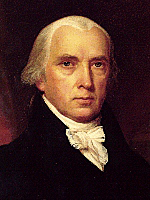James Madison, co-author of the “Federalist Papers,” was an Episcopalian and trained for the ministry with the Rev. Dr. John  Witherspoon. He was a member of the Virginia legislature from 1776-80 and 1784-86, of the Continental Congress in 1780-83, and the Constitutional Convention in 1787. It was in that Convention that he earned the title "Father of the Constitution."
Witherspoon. He was a member of the Virginia legislature from 1776-80 and 1784-86, of the Continental Congress in 1780-83, and the Constitutional Convention in 1787. It was in that Convention that he earned the title "Father of the Constitution."
He was a sponsor of the Bill of Rights while a member of the House of Representatives from 1789 to 1797, and authored the Virginia Resolutions of 1798 in opposition to the Alien and Sedition Act. He was Secretary of State from 1801 to 1809, 4th President of the United States from 1809 to 1817, and rector of the University of Virginia for ten years beginning in 1826.
He wrote on November 9, 1772 in a letter to William Bradford:
“A watchful eye must be kept on ourselves lest while we are building ideal monuments of Renown and Bliss here we neglect to have our names enrolled in the Annals of Heaven.”
In September of 1773, in a letter to William Bradford, he wrote:
“I have sometimes thought there could be no stronger testimony in favor of Religion or against temporal Enjoyments even the most rational and manly than for men who occupy the most honorable and gainful departments and are rising in reputation and wealth, publicly to declare their unsatisfactoriness by becoming fervent Advocates in the cause of Christ, & I wish you may give in your Evidence in this way. Such instances have seldom occurred, therefore they would be more striking and would be instead of a "Cloud of Witnesses."
In 1785, in Memorial and Remonstrance Against Religious Assessments, Madison wrote:
"It is the duty of every man to render to the Creator such homage. Before any man can be considered as a member of Civil Society, he must be considered as a subject of the Governor of the Universe.
"We have staked the whole future of American civilization, not upon the power of government, far from it. We have staked the future of all our political institutions upon the capacity of mankind for self government; upon the capacity of each and all of us to govern ourselves, to control ourselves to sustain ourselves according to the Ten Commandments of God."
Although he did speak of a "wall of separation," it is evident that the purpose of said "wall" was to prevent Congress from passing a national law to establish a national religion.
In an 1803 letter objecting to the use of government land for churches, he wrote:
“The purpose of separation of church and state is to keep forever from these shores the ceaseless strife that has soaked the soil of Europe in blood for centuries.”
Madison was in the habit of making notes in his personal Bible, wrote this in Acts, Chapter 19:
“Believers who are in a state of grace, have need of the Word of God for their edification and building up therefore implies a possibility of falling." v. 32.
“Grace, it is the free gift of God." Luke. 12. 32-v.32.
“Giver more blessed than the receiver." v. 35.
“To neglect the means for our own preservation is to tempt God: and to trust to them is to neglect Him." v. 3 & Ch. 27. v. 31.
“Humility, the better any man is, the lower thoughts he has of himself." v. 19.
“Ministers to take heed to themselves & their flock." v. 28.
“The Apostles did greater miracles than Christ, in the matter, not manner, of them." v. 11.